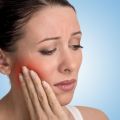6 Signs of Uneven Bite - Do You Have Them?

Most individuals define an uneven bite as clearly out of alignment in some way, such as significantly misaligned teeth, a pronounced overbite or underbite, or a crooked or twisted smile that causes them to be self-conscious when smiling.
However, an uneven bite is about much more than looks. Left untreated, a misaligned bite can cause pain and discomfort and increase the risk of decay and tooth loss. Is your bite uneven?
Here are some frequent indicators of an uneven bite.
1. Appearance
The most obvious indicator that your bite is uneven is your appearance. Teeth that are twisted, overcrowded, or otherwise crooked may be the most obvious signs, but there are other visual clues, such as how your teeth line up with your face's midline, especially when you smile.
Even if you can't see these symptoms, your dentist is trained to detect tiny flaws that could lead to significant problems later on.
2. Headache
If you experience frequent headaches, your uneven bite could be the cause. When your bite is not properly aligned, your teeth and jaw cannot "work" as intended. Over time, the muscles in your jaw might get strained, resulting in chronic headaches and TMD issues.
3. Grinding/Clenching
If you grind or clench your teeth, or if your sleeping partner says you sound like a cement mixer while sleeping, it's another sign that your bite is uneven. TMJ and headache symptoms and grinding and clenching develop due to your teeth striving for natural symmetry.
When your bite is uneven, your jaw muscles will clench and grind your teeth to compensate.
4. Jaw Pain/TMJ
If you experience pain or discomfort when you bite down hard or after repeated chewing or hear a clicking sensation in your ear while chewing, this is another symptom of uneven bite. An uneven bite can strain the muscles in your jaw during routine tasks such as chewing and talking.
This unevenness might result in temporomandibular joint condition or TMJ disorder in some circumstances. The temporomandibular joints assist your lower jaw meet your upper jaw precisely, allowing you to chew and speak without pain or trouble.
When your teeth are out of alignment, your joints must work harder to get them back in line. This produces the pain and clicking that may occur while chewing, yawning, or speaking.
5. Loose or Failing Dental Work
When teeth are not correctly aligned, the repetitive movements associated with chewing and even speaking can cause fillings, caps, and crowns to loosen over time. As a result, decay can grow into teeth you thought were protected by previous work.
Cavities and even tooth loss become a severe issue when dental work becomes loose or microscopic fractures or fissures emerge due to incorrectly aligned tooth surfaces clashing together.
6. Uneven Wear or Tooth Sensitivity
Uneven biting pressures can cause previous dental work to fail and worn patches on the tooth's surface. Enamel begins to wear away faster in specific areas, resulting in sensitivity.
Eroded enamel might also make the underlying tooth more susceptible to decay.
How to Treat an Uneven Bite
Bite alignment issues can be resolved with treatment options, including braces to improve bite, tooth removal for overcrowding, tooth restoration (e.g., reshaping, capping, or bonding), and surgery to adjust jaw length.
If you are concerned about your bite, consult your dentist for an educated opinion on the alignment of your teeth.
Why Is Normal Bite Important?
Uneven bites (malocclusions) might cause complications. Symptoms may include biting and chewing, speech issues such as lisps, breathing difficulties, and an odd facial look. Other complications are:
- Teeth grinding, wear, and fracture;
- Facial pain;
- Dental sensitivity;
- Increased gum disease and tooth decay.
A properly aligned bite makes teeth easier to clean, reducing the risk of tooth decay and gum illnesses like gingivitis. Less tension on your jaws and muscles may alleviate temporomandibular joint issues. A normal bite has aesthetic and physiological benefits. Consult your dentist about the alignment of your teeth and bite.
Other articles and publications:
Articles and publications of other companies:
- +1 (646) 270-9836
- Long Island City
- grantny.com










